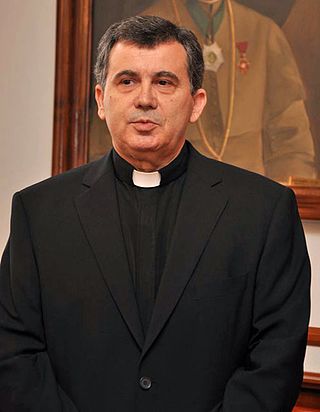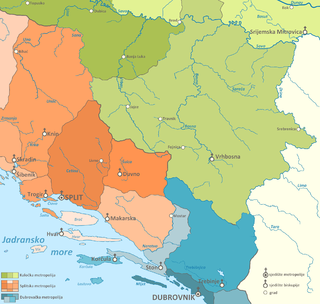
Tomislavgrad, also known by its former name Duvno, is a town and municipality located in Canton 10 of the Federation of Bosnia and Herzegovina, an entity of Bosnia and Herzegovina. It mainly covers an area of the historical and geographical region of Tropolje. As of 2013, it has a population of 33,032 inhabitants.

The Catholic Church in Bosnia and Herzegovina is a part of the worldwide Catholic Church under the spiritual leadership of the pope in Rome.

The Diocese of Trebinje-Mrkan is a particular church of the Catholic Church in Bosnia and Herzegovina. Established in the 10th century, is the oldest Catholic diocese in Bosnia and Herzegovina. By the number of faithful, it is also the smallest. Its seat is in Trebinje.

The Diocese of Mostar-Duvno is a particular church of the Catholic Church in Bosnia and Herzegovina. It encompasses northern Herzegovina. The episcopal seat is in Mostar, Bosnia and Herzegovina. It was formed on 5 July 1881, when the Apostolic Vicariate of Herzegovina was elevated to the diocese. It is the largest Catholic diocese in Bosnia and Herzegovina by the number of Catholics.

The Metropolitan Archdiocese of Vrhbosna is an ecclesiastical archdiocese of the Catholic Church. Its territorial remit includes the eastern parts of Bosnia and Herzegovina and the entirety of the Republic of North Macedonia. Its episcopal see is the city of Sarajevo (Vrhbosna), the capital of Bosnia and Herzegovina. The archdiocese has the following suffragans: in North Macedonia the Diocese of Skopje; in Bosnia, the dioceses of Banja Luka, Mostar-Duvno and Trebinje-Mrkan.

The Greek Catholic Church of Croatia and Serbia, sometimes called, in reference to its Byzantine Rite, the Byzantine Catholic Church of Croatia and Serbia, is a particular Eastern Catholic church in full communion with the Catholic Church. It consists of the Greek Catholic Eparchy of Križevci, covering Croatia, Slovenia, Bosnia and Herzegovina, and the Greek Catholic Eparchy of Ruski Krstur, covering Serbia. The Eparchy of Križevci was headed by Bishop Nikola Kekić until his retirement in March 2019, and since then the eparchy is governed by apostolic administrator Milan Stipić. The Eparchy of Ruski Krstur is headed by Bishop Đura Džudžar since his appointment in 2003.
The Eparchy of San Nicola di Ruski Krstur is a Greek Catholic Church of Croatia and Serbia ecclesiastical territory or eparchy of the Catholic Church in Serbia. It was founded in 2003 as apostolic exarchate with territory in Serbia and Montenegro, and was reduced to the territory of Serbia in 2013. In 2018, it was elevated to an eparchy by Pope Francis. Since 2003, it is headed by bishop Đura Džudžar.

The Eastern Orthodox Church is the most widespread Christian denomination in Bosnia and Herzegovina and the second most widespread religious group in the country, following Islam and followed in turn by Roman Catholicism. Orthodox Christians in Bosnia and Herzegovina belong to the Serbian Orthodox Church. According to the CIA World Factbook, Orthodox Christians make up 30.7% of the country's population.

The Eparchy of Križevci is a Greek Catholic Church of Croatia and Serbia eparchy of the Catholic Church in Croatia, Slovenia, and Bosnia and Herzegovina. Its current eparch is Milan Stipić. The cathedra is in the Cathedral of the Holy Trinity, in the episcopal see of Križevci, Croatia.
A particular church is an ecclesiastical community of faithful headed by a bishop, as defined by Catholic canon law and ecclesiology. A liturgical rite, a collection of liturgies descending from shared historic or regional context, depends on the particular church the bishop belongs to. Thus "particular church" refers to an institution, and "liturgical rite" to its ritual practices.
Franciscan Province of Herzegovina of the Ascension of the Blessed Virgin Mary is a province of the Catholic religious order of the Order of Friars Minor, commonly known as Franciscans. It was established in 1843 when it seceded from the Franciscan Province of Bosna Srebrena. Its headquarters are in Mostar.

Tomo Vukšić is a theologian and a prelate of the Catholic Church from Bosnia and Herzegovina who was named metropolitan archbishop of Metropolitan Archdiocese of Vrhbosna in January 2022, after serving two years as archbishop coadjutor. He has also been the apostolic administrator of the Military Ordinariate of Bosnia and Herzegovina since 2020.

The Diocese of Duvno was a Latin rite particular church of the Catholic Church that was established in the 14th century with a seat in present-day Tomislavgrad in Bosnia and Herzegovina. From the late 17th century onwards, it was administered by the bishops of Makarska, though by the 19th century it was only a titular see. On 5 July 1881 Pope Leo XIII incorporated it into the newly established Diocese of Mostar-Duvno. Its last titular bishop was Cyryl Lubowidzki, who held the title until 1897, when it was formally suppressed.
Apostolic Vicariate of Herzegovina was an apostolic vicariate of the Catholic Church in the Ottoman Herzegovina that existed between 1846 and 1881, when it was abolished with the Diocese of Mostar-Duvno established on its place.

Paškal Buconjić was Herzegovinian Croat Franciscan and a prelate of the Catholic Church who served as the first bishop of Mostar-Duvno from 1881 to 1910, as the apostolic administrator of Trebinje-Mrkan from 1890 to 1910, as the apostolic vicar of Herzegovina from 1880 to 1881, and as custos of the Franciscan Custody of Herzegovina between 1874 and 1879.

Ex hac augusta Principis Apostolorum cathedra is a papal bull issued by Pope Leo XIII on 5 July 1881, by which he restored the regular Church hierarchy in Bosnia and Herzegovina after its occupation by Austria-Hungary from the Ottoman Empire, with Archdiocese of Vrhbosna seated in Sarajevo having three suffragan dioceses: Banja Luka, Mostar-Duvno and Trebinje-Mrkan, with latter being under the administration of the bishop of Dubrovnik.













